 |
||||||||||||||
|
||||||||||||||
 |
||
|
 |
||||||||||||||||||||||||
|
||||||||||||||||||||||||
 |
||||||
|
||||||
 |
|||||||||
|
 |
||||||||||||||||||
|
||||||||||||||||||
 |
|||||||||||||||||||||
|
|||||||||||||||||||||
 |
||||||||||||||||||
|
||||||||||||||||||
|
|
||
|

|
||
 |
The 2,671st CyberAlert. Tracking Liberal Media Bias Since 1996
1:15pm EDT, Thursday June 19, 2008 (Vol. Thirteen; No. 116)
|
2. NYT Defends Michelle Obama, Suggests "Proud" Gaffe Overcovered
3. CBS's Tough Look at Obama: Loves Scrabble, Doesn't Like Ice Cream
4. CNN's Martin: 'Weak' Conservative Men 'Don't Like Strong Women'
5. CBS's Lara Logan: I'd Kill Myself If I Had to Watch American News
6. Goldberg: Russert Recognized Media Bias; 2003 Russert Interview
Whitaker used California Governor Arnold Schwarzenegger to illustrate "bipartisan" opposition as he reminded viewers of a spill nearly 40 years ago: "In California, which suffered a devastating oil spill from a rig off Santa Barbara in 1969, opposition to offshore drilling is bipartisan." Following a soundbite from Schwarzenegger, Whitaker hailed how "from Republican Governor Schwarzenegger to local environmentalists, California is largely green." Whitaker next tried to undermine the proposal: "Drilling opponents say reserves off California wouldn't last long. In fact, at current consumption rates, 21 million barrels a day, Americans would use up the estimated 18 billion barrels off the coasts all around the country in less than two and a half years."
But on the NBC Nightly News, Mark Potter ran a soundbite from energy analyst Daniel Yergin who predicted allowing offshore drilling "would send a psychological message to the world oil market which would affect prices before any of that new oil actually started to arrive." On ABC, Betsy Stark cited the same estimate of how the offshore oil represents "about two and a half years worth of U.S. consumption at current rates" and paraphrased the opinion of the experts she consulted: "Just the expectation of increasing domestic production at a time of tight supplies could drive down prices." [This item, by the MRC's Brent Baker, was posted Wednesday night on the MRC's blog, NewsBusters.org: newsbusters.org ] The MRC's Brad Wilmouth corrected the closed-captioning against the video to provide this transcript of the story on the Wednesday, June 18 CBS Evening News anchored by Russ Mitchell: RUSS MITCHELL: Now to a major political battle that is brewing over oil. There are billions of barrels of crude off the U.S. coast, but drilling for new wells has been banned for a quarter century. Today President Bush said America needs that oil, and called on Congress to take action so the oil companies can get it. Here's Bill Whitaker.
BILL WHITAKER: With gas prices topping $4 a gallon, President Bush says relief is at hand by lifting federal bans on offshore drilling, bans imposed in the 1980s by Congress and strengthened by the first President Bush. Today the current President Bush took aim at Congress, pressing Democrats to act first. 
Reporters Michael Powell and Jodi Kantor helped Michelle Obama soften her image in Wednesday's big front-page interview, "After Attacks, Michelle Obama Looks for a New Introduction." The long, laudatory piece was anchored with a large photo, taking up half the upper fold of the front page, of Michelle Obama listening thoughtfully to her husband's famous race speech back in March. The Times portrayed criticism of Michelle Obama as either hurtful or out of line. Her controversial comment in Wisconsin, "For the first time in my adult lifetime, I am really proud of my country," which suggested for many both a lack of pride in America and an unpleasant self-absorption, was dismissed by the Times as a mere "rhetorical stumble," with the implication that the media overplayed it (the Times certainly didn't). At least the Times did a rowback on its previous false assertion that conservative bloggers had been behind the rumor about Michelle Obama's "whitey" speech, when in fact, as the Times now writes, it was a "blogger who supported Senator Hillary Rodham Clinton" (Larry Johnson) who circulated the claim. [This item, by the MRC's Clay Waters, was posted Wednesday on the MRC's TimesWatch site: www.timeswatch.org ] An excerpt from the June 18 front page article:
Conservative columnists accuse her of being unpatriotic and say she simmers with undigested racial anger. A blogger who supported Senator Hillary Rodham Clinton circulates unfounded claims that Mrs. Obama gave an accusatory speech in her church about the sins of "whitey." Mrs. Obama shakes her head. "You are amazed sometimes at how deep the lies can be," she says in an interview. Referring to a character in a 1970s sitcom, she adds: "I mean, 'whitey'? That's something that George Jefferson would say. Anyone who says that doesn't know me. They don't know the life I've lived. They don't know anything about me." Now her husband's presidential campaign is giving her image a subtle makeover, with a new speech in the works to emphasize her humble roots and a tough new chief of staff. On Wednesday, Mrs. Obama will do a guest turn on "The View," the daytime talk show on ABC, with an eye toward softening her reputation. Her problems seemed hard to imagine last fall and winter. Mrs. Obama, a Harvard-trained lawyer, appeared so at ease with the tactile business of campaigning and drew praise for humanizing, often with humor, a husband who could seem elusive. Then came some rhetorical stumbles. In Madison, Wis., in February, she told voters that hope was sweeping America, adding, "For the first time in my adult lifetime, I am really proud of my country." Cable news programs replayed those 15 words in an endless loop of outrage. Barack Obama often blurs identity lines; much of his candidacy has seemed almost post-racial. Mrs. Obama's identity is less mutable. She is a descendant of slaves and a product of Chicago's historically black South Side. She burns hot where he banks cool, and that too can make her an inviting proxy for attack. Fox News called her "Obama's baby mama," a derogatory term for an unwed mother. Christopher Hitchens, a Slate columnist, claimed -- with scant evidence -- that her college thesis proved she was once influenced by black separatism. National Review presented her as a scowling "Mrs. Grievance."... SUSPEND Excerpt Has anyone except perhaps Christopher Hitchens and the Obama campaign read Michelle Obama's 225-page graduate thesis on race relations at Princeton in its entirety? The Times seems to be giving Michelle Obama the benefit of the doubt, even though that choice of topic itself bespeaks a bit of an obsession with race. For the thesis: www.scribd.com The Times story continued: The caricatures of Mrs. Obama as the Angry Black Woman confound her, friends say. Her own family crosses racial boundaries -- her mother-in-law and a sister-in-law are white -- and she has spent much of her adult life trying to address racial resentment.... In her senior thesis, she asked: Does immersion in an elite white institution draw blacks away from their community? She surveyed black Princeton alumni, finding their ties weakened after graduation. "The path I have chosen to follow by attending Princeton," Mrs. Obama wrote in the introduction, "will likely lead to my further integration and/or assimilation into a white cultural and social structure that will only allow me to remain on the periphery of society, never becoming a full participant." Mitchell Duneier, a sociology professor at Princeton who reviews undergraduate theses, noted that Mrs. Obama rejected some of her own theories. "Her senior thesis is being misread as if it is a polemical essay about her alienation," Professor Duneier said.... Rather than pulling Mrs. Obama behind a curtain, her husband's campaign is pushing her farther out on stage. She remains a charismatic presence, and when she gives her husband a fist bump or talks of him as a father, she is telling voters, this is a regular guy. This South Side woman anchors him in her reality.... Mrs. Obama has already had to check her brutally honest approach to talking about race. Now she co-stars in a campaign that would as soon mute most discussion of race. END of Excerpt For the entire story: www.nytimes.com Apparently that ballyhooed "national discussion about race" the Times gushed over back in March is no longer politically convenient and so is forgotten. See: www.timeswatch.org 
[This item, by Kyle Drennen, was posted Wednesday afternoon on the MRC's blog, NewsBusters.org: newsbusters.org ] In his report, Glor also described how: "...many people know Obama made history at Harvard by becoming the first African-American president of the Law Review. But did you know it was the conservative students who gave him the victory?" Glor then played a clip of Obama's communications director, Robert Gibbs, explaining that: "I think it would be a surprise for some people today that the conservative faction, along with another group, threw its support to Barack Obama because he believed they'd give him -- he'd give everyone a fair shake." Glor even commented on Obama's fashion sense: "Number two -- if you're wondering about that GQ look, don't expect stories about fancy custom tailoring." Lynn Sweet of the Chicago Sun Times elaborated: "I interviewed him. I said where do you get your suits? And he says he bought them off the rack at Nordstrom's and Bloomingdale's." Just like most average Americans who shop at high-end clothing stores. Finally, the one glimmer of substance in the story was number one: "...for the man who wants to usher in a new era of politics, he first won office as a state senator by using some old-school Chicago tactics." Sweet was again quoted: "He simply knocked his main competitor off the ballot. He challenged her nominating petitions. Her 'I's weren't dotted, her 'T's weren't crossed. He challenged her signatures. She was knocked off and bingo, that's how he first got into office." At the end of the segment Chen asked: "Okay, so after doing this story, what's the takeaway?" Glor responded by praising Obama's tenacity: "I mean, I think one thing that really emerges, this is a man who plays to win. No matter what it is, whether it's the woman wants to date or elected office or board games, there is an ambition there. There is a determination." Chen then added: "Sounds like presidential qualities." Glor promised a similar segment on John McCain would be airing soon. Here is the full transcript of the June 18 segment:
JULIE CHEN: Alright, during the long primary season, we all learned a lot about Barack Obama. He is a Senator. He's a Harvard grad. He's a husband. And he is a father. But this morning, you're going to learn five things you probably don't know about Barack Obama, as we welcome you back to "The Early Show." Even you don't know, I bet. .... 7:45AM SEGMENT:
JULIE CHEN: Between now and election day, we're going to hear a lot about Barack Obama and John McCain. But are we going to learn anything about them personally? Today, 'The Five Things You Should Know,' and we begin with Barack. Early Show national correspondent Jeff Glor is here. Good morning, Jeff. 
Host Anderson Cooper, seemingly surprised by this answer, followed up: "Well, are you saying that race is playing a role in this? Because I mean, if she was white, would she be being described as angry?" Martin ignored the whole racial component in his answer, and instead focused on gender: "Well, I think if you examined 1992, they tried to say Hillary Clinton was too tough, she was too commanding, she was too domineering. And that's what you have here. And so, they're trying to frame her that way, but it's ridiculous. There are no facts to substantiate that." "No facts to substantiate it"? I guess he forgot or didn't hear about the April 24 CBS Evening News story where a camera shot found the message, "Whatever Michelle Says Is The Message" written on a piece of paper at the Obama campaign's headquarters. [This is adapted from an item by Matthew Balan, posted Wednesday afternoon on the MRC's blog, NewsBusters.org: newsbusters.org ] Martin made the comments during a "Strategy Session" panel discussion 42 minutes into the 10 pm Eastern hour of the CNN program, which included Martin, CNN correspondent Candy Crowley, and The Huffington Post's Hilary Rosen. At the end of the segment, the CNN contributor returned to the same line of argument: "...I do think a lot of this is not because of race. That you have people who are -- who are critics of strong women, who represent First Ladies, who aren't just a matter of standing up there and reading the typical script. When she talks about policy, this is a woman who is an executive for a hospital. She can discuss health care. Why not let her talk about it?" At another point in the discussion, Cooper asked Crowley about Mrs. Obama's now-infamous "proud of my country" remark: "Candy, there have been some things that -- that Michelle Obama has said that have certainly raised people's eyebrows, raised a lot of criticism. Her comments about the first time she was really proud of being an American. I mean, that has been widely criticized." Crowley replied, "It has, and in some ways, that was the kicking off point. Because last summer, Michelle Obama was seen as this huge asset to him.... And then she made that remark and it came to light, 'I've never been -- for the first time in my adult life I'm proud of my country.' And boy, that was sort of the beginning of people really going after her...." The full transcript of the segment from Tuesday's Anderson Cooper 360:
ANDERSON COOPER: Technically, First Ladies don't run for office, but they are definitely judged in the court of public opinion. Before the break, we told you about changes being made in Michelle Obama's campaign staff. [I] want to talk more about that in our 'Strategy Session.' Joining us again, CNN's Candy Crowley, Hilary Rosen of HuffingtonPost.com. Also along with us is CNN's Roland Martin. Roland, do you think Michelle Obama is being held to a different standard as other first ladies -- potential first ladies? 
What became apparent in the segment was the South African-born journalist's distaste for both American journalism, which she is a part of, and her belief that Americans don't really care about Iraq. In addition to answering "no" when asked if she watches the news, host Jon Stewart proceeded to question her about Iraqi violence not getting enough media coverage. The Comedy Central anchor queried, "Have we lost our humanity with this entire situation?" "Yeah, we have," Logan agreed. [This item, by the MRC's Scott Whitlock, was posted Wednesday afternoon on the MRC's blog, NewsBusters.org: newsbusters.org ] Logan, who in late 2007, complained to Tonight Show host Jay Leno that "we're doing extremely badly" in Iraq, also used her appearance on the Comedy Central program to bash First Lady Laura Bush. After dismissing "armchair academics" who don't really know what the situation is like in Afghanistan or Iraq, she scolded: "See Laura Bush saying this is my third time in Afghanistan. She doesn't mention that she was only there for a few seconds..." When Stewart wondered if such individuals might not really be looking for the truth of the situation, Logan playfully shrugged her shoulders. The reporter, who has made several trips to Iraq and Afghanistan, repeatedly implied that very few have the understanding she has about the Middle East. After agreeing with Stewart's assessment that Americans have lost their humanity over the situation in Iraq, Logan made this statement about reporting bad news: "You know, I was asked once do you feel responsible for the American public having a bad view, a negative view of the war in Iraq? And I looked at the reporter and I said tell me the last time you saw the body of a dead American soldier. What does that look like? Who in America knows what that looks like? 'Cause I know what that looks like. And I feel responsible for the fact that no one else does." Logan made almost this exact point previously. The October 16 CyberAlert noted that on The Tonight Show she also decried hidden images of U.S. casualties in remarkably similar language: "We're doing extremely badly, from my point of view. I was asked if I felt any guilt for the fact that the world has an impression of the war in Iraq as being very bad and going very wrong? And I said I really don't because I can't imagine the last time anyone saw a dead American soldier. We've hidden that from view." See the October 16 CyberAlert posting for more: www.mrc.org Finally, for a serious reporter, Logan managed to drop two profanities into the five minute segment, including telling Stewart she introduces herself to soldiers this way: "They've been told not to swear about you and you say, 'Yo, what's up [profanity bleeped]?' and then it's all done." A transcript of her June 17 appearance on the The Daily Show:
JON STEWART: Welcome back. My guest tonight, she is the chief foreign correspondent for CBS News. Please welcome to the program Lara Logan. Ma'am. ( cheers and applause ) How are you? Come and join me. Please have a seat. You remind me of a young Ted Koppel. 
Goldberg recalled that when he wrote Bias: A CBS Insider Exposes How the Media Distort the News, "no one in network television wanted to discuss the issue, no matter how many Middle Americans thought it was important." But "Russert was the lone exception. He had me on his CNBC interview show, and we talked about bias for a full hour." (Screen captures, in posted version of this CyberAlert, are from that interview on the February 23, 2002 edition of Russert's CNBC show.) In his op-ed, Goldberg quoted from an interview he conducted with Russert for his 2003 book, Arrogance: Rescuing America from the Media Elite. (Below is a full reprint of that book chapter.) His June 18 Journal op-ed: online.wsj.com Goldberg's Web site: www.bernardgoldberg.com
Goldberg wrote in the Journal piece about the same admonition from Russert which Goldberg had highlighted Friday night on FNC: Barnes and Noble page for the Bias book: search.barnesandnoble.com [This item, by the MRC's Brent Baker, was posted Wednesday afternoon on the MRC's blog, NewsBusters.org: newsbusters.org ]
So, from pages 78-85 of Goldberg's 2003 book, Arrogance: Rescuing America from the Media Elite, a chapter titled "A Conversation with Tim Russert," as typed up by MRC interns interns Lyndsi Thomas and Peter Sasso: Watching Tim Russert, you get an idea of what a fair-minded mainstream press might look like. I know he used to work for Mario Cuomo, one of the most liberal Democrats around, as well as for New York's longtime moderate Democratic Senator Pat Moynihan. So I might guess which way he leans politically, but I'd only be guessing. Because watching him on the air, you don't know what his personal politics are, since he gives all sides a fair and equal say -- and just as important, he challenges all sides with equal skepticism and vigor. Very simply, Tim Russert tries to be fair, and it shows -- which is why, I think, his Meet the Press is by far the most popular of the Sunday morning interview shows. There are probably a lot of reasons Russert stands out from his colleagues in the world of elite journalism, so when he agreed to talk to me for this book, I thought that maybe the place to start was with his background. GOLDBERG: I think a lot of people have seen a fairness in you that they're not used to seeing on the networks, and I'm wondering how much you think your blue-collar background has to do with it. RUSSERT: There's no substitute for it, Bernie, believe me. I've worked on garbage trucks. I drove a taxi. I tended bar. I delivered pizzas. I worked with liberals, conservatives, blacks, whites; that's how you grew up in this interesting world, and people were always simply judged in the end on their quality as a person: Did they tell the truth? Did they honor their commitments? Did they show up for work on time? GOLDBERG: What I learned from my father, who worked in a factory, while I was growing up in the Bronx, was the same thing: You show up to work on time, and if you tell someone you're going to do something, you do it. Those are old-fashioned values. RUSSERT: My dad said that all the time: People are people; they'll treat you the way you treat them -- and I have adhered to that the best I possibly can. And I also believe that going to the schools I did -- St. Bonaventure school, Canisius High School, John Carroll University -- these are not fashionable, elitist schools. These are schools where you learn to read and write and learn right from wrong. But they would never wave a wand and say, this is the way you must think. The key to it was always respecting another person's view and never suggesting that anyone had a monopoly on correctness. And that should be the centerpiece to being a journalist. You don't go out there bringing to your profession an attitude that you know what is right for the country or you know what view is the progressive one or the appropriate one to have. GOLDBERG: On the other hand, I've worked with network people who literally referred to the audience as white trash. They were talking about people who didn't go to school in the Northeast and sometimes literally did live in trailers. RUSSERT: They've said it about me: "Russert attended middling schools. Russert admits to being a practicing Catholic." GOLDBERG: Admits??? RUSSERT: [laughing] Right!!! "If he didn't go to Harvard, if he's not Ivy League, how can he be smart?" Bernie, there's not a moment when I'm sitting there on Meet the Press when I'm not thinking about my dad. He's in my head; he's in my heart. That's why I ask them straight questions: What are you going to do about that issue? How about this one? Well, that's not what you said about this! It's the way our dad engaged us -- always give the other guy the benefit of the doubt but hear him out. Hear him out. And don't dismiss him and don't brand him as anything. It's not right. I think it's so imperative, particular for those of us who have been blessed with these jobs in journalism, to approach things in an open-minded way. GOLBERG: Does your blue-collar radar detect an elitism even amongst your colleagues? RUSSERT: Sure, some. Among politicians, among journalists, it exists. I'm all for hiring women in the newsroom and minorities in the newsroom -- I'm all for it. It opens up our eyes and gives us a different perspective. But just as well, let's have people with military experience. Let's have people from all walks of life. People from the top echelon schools, but people from junior colleges and the so-called middling schools -- that's the rich pageantry of America. GOLBERG: It seems to me, Tim, that you're a real proponent of diversity. You believe in it when it comes to race and gender and ethnicity because it's better to have lots of people with different points of view covering the news, and... RUSSERT: ...and you need cultural and ideological diversity, also. That's central to this. I'm a great believer in racial diversity and gender diversity, but you need cultural diversity, you need ideological diversity. You need it. GOLDBERG: You say we need ideological diversity in the newsroom. But how do you actually do that? How do you get all sorts of people with all sorts of backgrounds and worldviews into the newsroom? RUSSERT: Take Meet the Press. Every person on Meet the Press staff started out as an intern. But I make sure they come from a cross-section of schools. We've had kids from Holy Cross and Fordham, for example. GOLDBERG: So you go to places where kids might be traditionally liberal, but you also go to places where kids, because of their... RUSSERT: ...culture... GOLDBERG: ...because of their culture, might be conservative? RUSSERT: Absolutely right. GOLDBERG: When I say that I see a liberal bias in the news, a lot of journalists who live in a world of politics dismiss it. They say, "What are you talking about? We don't go easy on Democrats and tough on Republicans." And I say there's a lot of truth to that. But that's not my point about liberal bias. While there is no conspiracy -- no conspiracy -- there is like-mindedness in too many newsrooms . . . RUSSERT: That's a potential cultural bias. And I think it's very real and very important to recognize and deal with. Because of background and training you come to issues with a preconceived notion or a preordained view on subjects like abortion, gun control, campaign finance. I think many journalists growing up in the sixties and the seventies have to be very careful about attitudes toward government, attitudes toward the military, attitudes toward authority. It doesn't mean there's a rightness or a wrongness. It means you have to constantly check yourself. John Chancellor used to say, if your mother says she loves you, check it out. GOLDBERG: Why the closed-mindedness when the subject comes around to media bias? There are a whole bunch of people in the world of journalism and the world of academia who just shut the discussion down. They not only don't believe there's this cultural bias, they think it's not worth talking about. RUSSERT: That, to me, is totally contrary to who we're supposed to be as journalists. My view was, invite Bernard Goldberg and Bias on my [CNBC] show. This is central to who we are. Let's talk about it! If we miss a story, if we got our facts wrong, we would have a postmortem and ask ourselves, where did we go wrong? How can we improve ourselves? So, if there's any suggestion in any way, shape, or form that there's a liberal bias, a cultural bias, let's examine it; that's what we do for a living. GOLDBERG: When I was on your show we talked, off the air, during a commercial, about the op-ed I wrote in the Wall Street Journal back in 1996 about liberal bias in the news, which caused quite a furor. You told me that you actually passed the op-ed around the newsroom in Washington. Do you remember that? RUSSERT: The first person I talked to that morning was Tom Brokaw, and I said, "Did you see the piece?" and he said "I sure did," I told him that I was going to give it out down here. I talked to people about it. I said, "We have to engage on this issue. It is imperative that we talk about this issue." If someone suggested there was an anti-black bias, an anti-gay bias, an anti-American bias, we'd sit up and say, " Let's talk about this; let's tackle it." Well, if there's a liberal bias or a cultural bias, we have to sit up and tackle it and discuss it. We have got to be open to these things. GOLDBERG: This willingness to be more open goes back to those early days in Buffalo, doesn't it? RUSSERT: As I say, the people I grew up around had a wonderful way of encouraging, insisting that you understand people, that you give them their say and not be dismissive of any point of view. No one has a monopoly on what is right and what is wrong. GOLDBERG: I think that piece of advice -- "don't be dismissive of people" -- while it may sound fairly obvious, just might be the single most important piece of advice you ever received. RUSSERT: It's so imperative that when you sit around a table and discuss stories that people be there from different perspectives and different life situations. For example, for me a robust conversation is with people who are for abortion rights and people who are against abortion rights. It's just central to a journalist that we not adopt a code of correctness that this is the preferred position on the issue. When I had [Democratic House Leader] Nancy Pelosi on Meet the Press, she said that when Newt Gingrich was Speaker, he was radical and extreme right wing and [House Majority Whip] Tom DeLay is far right, and when I said then the dichotomy is that you would be perceived as far left, she said, "No, no, I'm moderate, I'm centrist." GOLDBERG: But you see, Tim, in my view, that same point can be made about journalists, too. When you get to the big social issues -- whether it's race or gender or feminism or gay rights -- I think journalists see conservatives correctly as conservative, but they see liberals as middle of the road. RUSSERT: I think this is the most important challenge confronting journalists: There is no preferred position. One cannot be dismissive of one person as extreme and find another acceptable just because of how you define liberal, conservative or mainstream. To a journalist covering this country, there should not be a preferred position on abortion, a preferred position on gay marriage, a preferred position on gun control, a preferred position on campaign finance reform. And you have to work at it and think back to where you came from and keep applying those same standards. It really is fascinating to me when you talk to political figures and to some journalists, they'll say the center is here -- if you are for abortion rights, for gun control, for campaign finance reform, that's a mainstream position; and those opposed to it are on the fringe. And that's just not the way reporters should approach issues. GOLDBERG: But when you say it's the most important challenge confronting journalists... RUSSERT: It truly is. GOLDBERG: Is that because you see a problem in that area? RUSSERT: Whenever we were going through the whole situation with President Clinton on a variety of issues involving his veracity, I would say in the newsroom: What if President Nixon had said this? And people would sit up [because they hadn't thought of it that way]. You have to apply a single standard. And the single standard has to be one of objectivity and not in any way, shape, or form demonstrating a preferred position. And if you call Tom DeLay -- and I have -- the conservative Texan, then I call Ms. Pelosi the liberal Californian. GOLDBERG: Speaking of all this, you had Rush Limbaugh on Meet the Press? How did you come to that decision? RUSSERT: He has the most widely listened to radio program in America, he has done an enormous amount to engage and encourage political discussion around the country; he articulates a political philosophy as well as anyone in the country. To suggest his views are anathema and therefore should not be put on... GOLDBERG: But you have heard from the critics. RUSSERT: Oh, sure. They want to know, "Why would you have Rush Limbaugh on Meet the Press?" I don't sanction his political views by having him on. But to suggest that he does not deserve the opportunity to present his views -- I mean, Meet the Press is a forum for ideas! And to have a censorship for his ideas . . . [laughs] You may disagree with him philosophically, but his demeanor, his presentation was perfectly appropriate for Meet the Press. And to suggest otherwise is absurd. By the way, when I have Ralph Nader on, I say to people, "I didn't hear any complaints there" [laughs]. GOLDBERG: Some conservatives complain that when the subject gets around to taxes you tilt to the Left, that you ask too many questions about whether we an afford tax cuts but not enough questions about whether the government is spending too much. RUSSERT: I guess you can conclude that by watching me question people, that I think deficits matter. I guess if there's a bias, it's that yes, I do think that deficits matter. And you know where that comes from? [laughing] It comes form Mom and Dad's kitchen table. We never floated loans. GOLDBERG: But there are two ways to balance the budget, whether it's around the kitchen table or in Congress. One is by raising revenue. So your father can go out and get a third full-time job. Or you can cut out some spending. RUSSERT: Exactly right. I couldn't agree more. But I question both tax cuts and spending. I was aggressive regarding the cost of the Clinton health care plan. I was very aggressive about the cost of Medicare and Social Security. I constantly say to Democrats, "Can you have it all?" GOLDBERG: Let's jump to another subject. When you interviewed Vice President Cheney on Meet the Press, you wore the red, white and blue ribbon on your lapel. RUSSERT: That was on September 16, 2001, at Camp David.
RUSSERT: A very good friend of mine died at the World Trade Center, and his family asked if I would, in his memory, wear this ribbon. I never thought for a second about it. GOLDBERG: And to those who say journalists shouldn't wear red, white and blue ribbons, that by doing that somehow you're taking the government's side in some debate or another -- which I don't frankly see, by the way... RUSSERT: It is imperative that we never suggest that there's a moral equivalency between the United States of America and the terrorists. Period. I'll believe that until the day I die. I have talked about being a journalist -- but also being an American. And first and foremost, you're an American. I want a debate about national security, and who defines national security. I understand all that. But in the end, you have to make judgements, and on that day I made a judgement that five days after the most horrific event of my lifetime and of my journalistic career, that for me to say to the country I too am part of this, I too have experienced this gut-wrenching pain and agony, and I too have enormous remorse and sympathy, with not only the people who died in the World Trade Center, the Pentagon, and in the field in Pennsylvania, but all of us -- we're in this together; this isn't covering Democrats and Republicans or the Bills versus the Redskins; this is us. The Taliban doesn't believe in the First Amendment. I'm an American and then I'm a journalist. END of the Chapter Barnes and Noble's page for Arrogance: Rescuing America from the Media Elite: search.barnesandnoble.com -- Brent Baker 
Home | News Division
| Bozell Columns | CyberAlerts |







 ABC's World News and the NBC Nightly News gave plenty of time to left-wing environmentalists and Democrats opposed to President Bush's call to open up oil drilling off the shores of the continental U.S., but unlike the CBS Evening News the two newscasts provided equal time to supporters and experts who predicted it would lower gas prices. CBS reporter Bill Whitaker began with pro and con soundbites, but his story quickly deteriorated into a brief against the proposal with opponents and those saying it would do nothing to lower prices getting twice as many soundbites (4) as supporters (2).
ABC's World News and the NBC Nightly News gave plenty of time to left-wing environmentalists and Democrats opposed to President Bush's call to open up oil drilling off the shores of the continental U.S., but unlike the CBS Evening News the two newscasts provided equal time to supporters and experts who predicted it would lower gas prices. CBS reporter Bill Whitaker began with pro and con soundbites, but his story quickly deteriorated into a brief against the proposal with opponents and those saying it would do nothing to lower prices getting twice as many soundbites (4) as supporters (2). 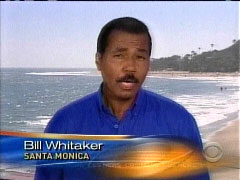 For expertise, Whitaker featured only Severin Borenstein of the University of California: "Even if we approved oil drilling off the coast today, it would have no effect on the price of oil and no effect on the price we're paying for gasoline for five or ten years."
For expertise, Whitaker featured only Severin Borenstein of the University of California: "Even if we approved oil drilling off the coast today, it would have no effect on the price of oil and no effect on the price we're paying for gasoline for five or ten years." 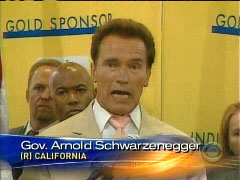 GOVERNOR ARNOLD SCHWARZENEGGER (R-CA): I myself want to do everything that I can to make sure that California is protected.
GOVERNOR ARNOLD SCHWARZENEGGER (R-CA): I myself want to do everything that I can to make sure that California is protected.  rates, 21 million barrels a day, Americans would use up the estimated 18 billion barrels off the coasts all around the country in less than two and a half years.
rates, 21 million barrels a day, Americans would use up the estimated 18 billion barrels off the coasts all around the country in less than two and a half years. 
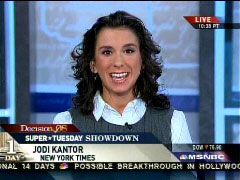 Who needs Fightthesmears.com when you have the New York Times? Dismissing Michelle Obama's "For the first time...I am really proud of my country" gaffe as a "rhetorical stumble," the New York Times rallied around its pick for future First Lady against out-of-line conservative critics.
Who needs Fightthesmears.com when you have the New York Times? Dismissing Michelle Obama's "For the first time...I am really proud of my country" gaffe as a "rhetorical stumble," the New York Times rallied around its pick for future First Lady against out-of-line conservative critics. 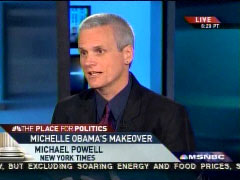 Michelle Obama's eyes flicker tentatively even as she offers a trained smile. As her campaign plane arcs over the Flathead Range in Montana, she is asked to consider her complicated public image.
Michelle Obama's eyes flicker tentatively even as she offers a trained smile. As her campaign plane arcs over the Flathead Range in Montana, she is asked to consider her complicated public image. 
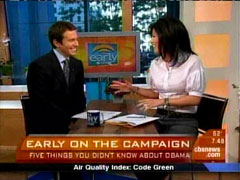 On Wednesday's CBS Early Show, co-host Julie Chen teased an upcoming segment on Barack Obama: "During the long primary season, we all learned a lot about Barack Obama. He is a Senator. He's a Harvard grad. He's a husband. And he is a father. But this morning, you're going to learn five things you probably don't know about Barack Obama." Later, in David Letterman style, correspondent Jeff Glor introduced the story: "Here are the top five things you likely don't know about Barack Obama." Among those things, were important facts such as "Number four -- in addition to enjoying basketball and cycling during down time, Obama loves to play Scrabble." In addition to the top five, Glor later added: "Now one more thing we learned that didn't quite make our list, Julie. Obama's job as a teenager was at a Baskin Robbins and to this day he does not like ice cream." Chen responded: "So rocky road is like his Kyrptonite?" While Glor and Chen focused on Obama trivia, earlier in the show, co-host Russ Mitchell offered a mere one sentence news brief on the Illinois Senator's opposition to a Republican plan to allow offshore oil drilling.
On Wednesday's CBS Early Show, co-host Julie Chen teased an upcoming segment on Barack Obama: "During the long primary season, we all learned a lot about Barack Obama. He is a Senator. He's a Harvard grad. He's a husband. And he is a father. But this morning, you're going to learn five things you probably don't know about Barack Obama." Later, in David Letterman style, correspondent Jeff Glor introduced the story: "Here are the top five things you likely don't know about Barack Obama." Among those things, were important facts such as "Number four -- in addition to enjoying basketball and cycling during down time, Obama loves to play Scrabble." In addition to the top five, Glor later added: "Now one more thing we learned that didn't quite make our list, Julie. Obama's job as a teenager was at a Baskin Robbins and to this day he does not like ice cream." Chen responded: "So rocky road is like his Kyrptonite?" While Glor and Chen focused on Obama trivia, earlier in the show, co-host Russ Mitchell offered a mere one sentence news brief on the Illinois Senator's opposition to a Republican plan to allow offshore oil drilling. 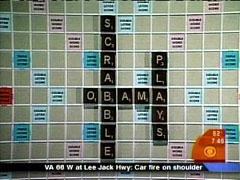 GLOR: Number three -- many people know Obama made history at Harvard by becoming the first African-American president of the Law Review. But did you know it was the conservative students who gave him the victory?
GLOR: Number three -- many people know Obama made history at Harvard by becoming the first African-American president of the Law Review. But did you know it was the conservative students who gave him the victory? 
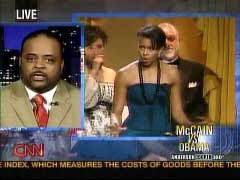 CNN contributor Roland Martin, when asked on Tuesday's Anderson Cooper 360 if Michelle Obama was being held to a different standard than other presidential candidates' wives, unequivocally placed the blame on conservative men: "No, I think what you have is you've got some weak men on the conservative side who, frankly, don't like strong women. I mean, we saw the exact same thing take place for Hillary Clinton back in 1992....All of a sudden...Michelle Obama is this angry black woman, when in fact, she's an accomplished woman, a mother, a wife. And so, they are trying to define her in that way, because they don't want to deal with the reality."
CNN contributor Roland Martin, when asked on Tuesday's Anderson Cooper 360 if Michelle Obama was being held to a different standard than other presidential candidates' wives, unequivocally placed the blame on conservative men: "No, I think what you have is you've got some weak men on the conservative side who, frankly, don't like strong women. I mean, we saw the exact same thing take place for Hillary Clinton back in 1992....All of a sudden...Michelle Obama is this angry black woman, when in fact, she's an accomplished woman, a mother, a wife. And so, they are trying to define her in that way, because they don't want to deal with the reality." 
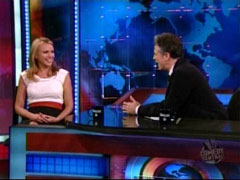 Chief foreign correspondent for CBS News Lara Logan appeared on Tuesday's Daily Show With Jon Stewart to declare that she doesn't watch American news (that would presumably include her own network). She also decried: "If I were to watch the news that you're hearing in the United States, I'd just blow my brains out. 'Cause it would drive me nuts." (How does CBS feel about this?)
Chief foreign correspondent for CBS News Lara Logan appeared on Tuesday's Daily Show With Jon Stewart to declare that she doesn't watch American news (that would presumably include her own network). She also decried: "If I were to watch the news that you're hearing in the United States, I'd just blow my brains out. 'Cause it would drive me nuts." (How does CBS feel about this?) 
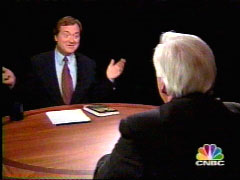 In an op-ed in Wednesday's Wall Street Journal (page A-15), "Russert Took Media Bias Seriously," former CBS News correspondent Bernard Goldberg observed: "What made Tim Russert different, and better, I think was his willingness to listen to -- and take seriously -- criticism about his own profession. He was willing, for example, to keep an open mind about a hot-button issue like media bias -- an issue that so many of his colleagues dismiss as the delusions of right-wing media haters."
In an op-ed in Wednesday's Wall Street Journal (page A-15), "Russert Took Media Bias Seriously," former CBS News correspondent Bernard Goldberg observed: "What made Tim Russert different, and better, I think was his willingness to listen to -- and take seriously -- criticism about his own profession. He was willing, for example, to keep an open mind about a hot-button issue like media bias -- an issue that so many of his colleagues dismiss as the delusions of right-wing media haters." 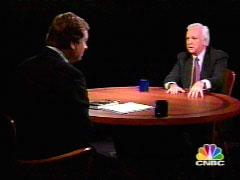 With Russert's funeral memorial service on Wednesday, I thought this would be an appropriate time for a reminder of the values Russert brought to his position and concerns for his profession outlined best in his interview with Goldberg.
With Russert's funeral memorial service on Wednesday, I thought this would be an appropriate time for a reminder of the values Russert brought to his position and concerns for his profession outlined best in his interview with Goldberg. 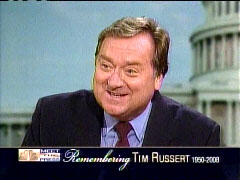 GOLDBERG: And you heard from critics about that, too.
GOLDBERG: And you heard from critics about that, too.